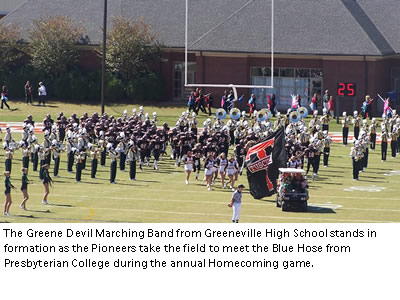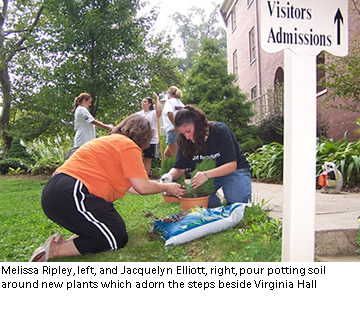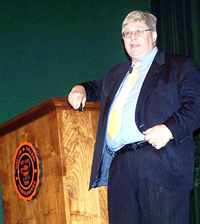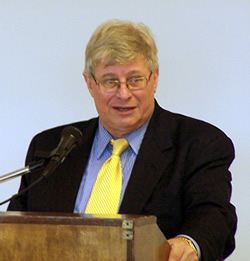With encouragement from the Tusculum College chaplain to live their lives with a high degree of “soul” sensitivity, 445 graduates received degrees Saturday from Tennessee’s oldest institution of higher learning.
The ceremony began at 11 a.m. in the Pioneer Arena inside Niswonger Commons on campus. President Dr. Dolphus E. Henry and Dr. Kimberly K. Estep, provost and academic vice president, conferred the degrees and distributed the diplomas.
Among those who were graduated, 124 earned graduate degrees – 91 receiving master of arts in education degrees and 33 master of arts in organizational management degrees.
Earning bachelor degrees were 321 students – 81 graduated from the college’s program for traditional-age college students and 240 graduated from the bachelor’s programs that are part of the college’s Graduate and Professional Studies program for working adults. Twenty-eight students of this group earned bachelor of arts in education degrees and 212 earned bachelor of science degrees in organizational management.
The Rev. Dr. Stephen Weisz, campus chaplain, in his baccalaureate sermon, “With All Your Soul,” encouraged the graduates to “lead with soul.” A number of the graduates, he noted, will be managers in one way or another, whether in business, a classroom environment, or in service or professional care of others.
Management involves more than factual analysis and decisions, Dr. Weisz said; it requires “soul.” He noted that he had been recently lent the book, “Leading With Soul,” in which the authors, Lee G. Bolman and Terrence E. Deal, stress that good leadership requires “something that all of us can give others – that powerful, indefinable thing called soul.”
“God expects you to manage others with care, feeling, and with the unique soul that He has given to each of you,” Dr. Weisz told the graduates. “Employees under you may need compassion, empathy, a listening ear, and words of encouragement.”
Although there is a prevalent idea that praise of workers will lead to a decline in productivity, he noted, studies have shown the opposite is true as workers who were regularly praised were more creative and productive in their jobs.
Dr. Weisz recalled seeing a colleague in a long conversation with a student to give encouragement on exam day. “That is something we can all take time to do wherever we are,” he added.
“What should you do with your college career?” he rhetorically asked the graduates. “Is it only a way to make a living? . . . Is there not something more? There is, and is it not leading with soul?”
The graduates were also addressed by Susan Vance, director of development and alumni relations, who congratulated as the latest alumni of the state’s oldest college and encouraged them to remain connected and involved with their alma mater.
The commencement was well-attended, Pioneer Arena being filled and overflow visitors being placed in the Chalmers Conference Center elsewhere in the Niswonger Commons. A closed-circuit broadcast of the ceremony was piped into the overflow area.
One difference in this graduation was the absence of Jim Winfree, who usually provides organ accompaniment. Substituting for him was Carolyn Gregg, assistant professor of research and co-director of the Warren W. Hobbie Center for the Civic Arts at Tusculum College.
Director of Academic Advising Jill Jones led the singing of the Alma Mater. Bagpipe music for the processional and recessional was provided by Jon Shell and Ben Pollard.Tusculum College holds two commencement ceremonies each year, one in the spring and the other in December.



 Two area Tusculum College educators received major honors from the college’s Alumni Association during Homecoming events on Oct. 14, as did a local TC staff member who is herself a Tusculum College alumna. Professor of Psychology and Associate Vice President for Academic Affairs Dr. Melinda Dukes of Johnson City received the National Alumni Recognition Award from the TC Alumni Association during its annual meeting Saturday morning on the campus.
Two area Tusculum College educators received major honors from the college’s Alumni Association during Homecoming events on Oct. 14, as did a local TC staff member who is herself a Tusculum College alumna. Professor of Psychology and Associate Vice President for Academic Affairs Dr. Melinda Dukes of Johnson City received the National Alumni Recognition Award from the TC Alumni Association during its annual meeting Saturday morning on the campus. Wayne Meisel, president of the Bonner Foundation, on Thursday told Tusculum College students in the service leader program that bears the foundation’s name that their group is among the best in the country.
Wayne Meisel, president of the Bonner Foundation, on Thursday told Tusculum College students in the service leader program that bears the foundation’s name that their group is among the best in the country. More than 100 people attended the “Women in Leadership: A Networking Luncheon for the Next Generation” on Friday, September 22, at Tusculum College.
More than 100 people attended the “Women in Leadership: A Networking Luncheon for the Next Generation” on Friday, September 22, at Tusculum College. The grounds around one of the College’s most historic buildings received an afternoon of tender love and care on Monday, thanks to staff members from the offices of Admission and Financial Aid and Tusculum College President Dr. Dolph Henry.
The grounds around one of the College’s most historic buildings received an afternoon of tender love and care on Monday, thanks to staff members from the offices of Admission and Financial Aid and Tusculum College President Dr. Dolph Henry. Groups of Tusculum College students could be found Thursday surveying creek banks, painting school playground equipment, and repairing a riding rink used in the rehabilitation of individuals with brain injuries.
Groups of Tusculum College students could be found Thursday surveying creek banks, painting school playground equipment, and repairing a riding rink used in the rehabilitation of individuals with brain injuries. In a presentation liberally sprinkled with insights from a variety of historical figures, a noted ethicist urged a Tusculum College audience Thursday morning (Aug. 31) to “live a life that matters” and to “move beyond success into significance.”
In a presentation liberally sprinkled with insights from a variety of historical figures, a noted ethicist urged a Tusculum College audience Thursday morning (Aug. 31) to “live a life that matters” and to “move beyond success into significance.” A look at the current state of ethics in the United States brings both good and bad news, says Michael Josephson, founder of the institute that developed the CHARACTER COUNTS! youth-education initiative used in schools in Tennessee and across the nation.
A look at the current state of ethics in the United States brings both good and bad news, says Michael Josephson, founder of the institute that developed the CHARACTER COUNTS! youth-education initiative used in schools in Tennessee and across the nation. Members of Tusculum College faculty and staff help students move onto campus. Tusculum College faculty and staff members, along with fall sport student-athletes of the Greeneville-based college, helped new students move into residence halls on the campus on Aug. 17.
Members of Tusculum College faculty and staff help students move onto campus. Tusculum College faculty and staff members, along with fall sport student-athletes of the Greeneville-based college, helped new students move into residence halls on the campus on Aug. 17.